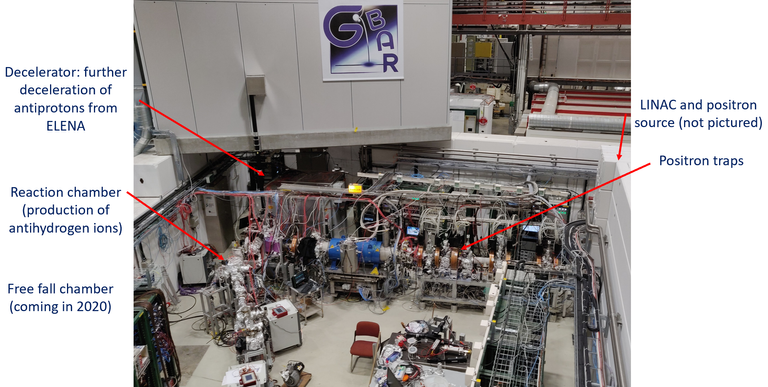In Part 3 of this series investigating the Antimatter Factory at CERN and its research to the general public, we discussed how antiprotons are produced and decelerated so that they can be studied.
In this post, we will discuss an experiment which receives these antiprotons and studies the effect of gravity of antihydrogen particles.

Experiment aims
GBAR (Gravitational Behaviour of Antihydrogen at Rest) aims to measure the effect of gravity on antihydrogen atoms. Located in the Antimatter Factory hall, this experiment will be one of the first to receive antiprotons from the new Extra Low Energy Antiproton (ELENA) ring. This experiment is preparing to answer the following question – what is the effect of gravity on antimatter? While several theories exist as to whether antimatter will behave like matter or not, a definitive experimental result is still missing.
Methodology
The experiment will use antiprotons supplied by the ELENA ring and positrons (anti-electrons) created by a linear accelerator (1.2 metres long) to produce antihydrogen ions as shown in the picture below. The linear accelerator is able to produce 100 million positrons per second, where accelerated electrons crash into a tungsten target, producing intense X-rays that convert into electron-positron pairs. Positron traps are able to cool and accumulate billions of positrons, and just before the arrival of antiprotons from ELENA, they are promptly ejected toward the reaction chamber to produce the ions.
The ions consist of one antiproton and two positrons, and being charged, it makes them significantly easier to control. Using lasers, their velocity will be reduced to 50 centimeters per second. This will allow them to be directed to a fixed point. Then, trapped by an electric field, one of their positrons will be removed with a laser, which will make them neutral again. The only force acting on them at this point will be gravity and they will be free to make a 20-centimetre fall, recorded using detectors surrounding the free-fall chamber (due in 2020). [1]
What should happen?
The results might turn out to be very exciting. As the spokesperson of GBAR, Patrice Pérez, explains: “Einstein’s Equivalence Principle states that the trajectory of a particle is independent of its composition and internal structure when it is only submitted to gravitational forces. If we find out that gravity has a different effect on antimatter, this would mean that we still have a lot to learn about the universe”.[1]
References:
[1] https://home.cern/news/news/physics/raising-gbar-antimatter-exploration

✅ Enjoy the vote! For more amazing content, please follow @themadcurator for a chance to receive more free votes!
Congratulations @cgrech! You have completed the following achievement on the Steem blockchain and have been rewarded with new badge(s) :
Click here to view your Board
If you no longer want to receive notifications, reply to this comment with the word
STOPHello @cgrech! This is a friendly reminder that you have 3000 Partiko Points unclaimed in your Partiko account!
Partiko is a fast and beautiful mobile app for Steem, and it’s the most popular Steem mobile app out there! Download Partiko using the link below and login using SteemConnect to claim your 3000 Partiko points! You can easily convert them into Steem token!
https://partiko.app/referral/partiko
Congratulations @cgrech! You received a personal award!
You can view your badges on your Steem Board and compare to others on the Steem Ranking
Vote for @Steemitboard as a witness to get one more award and increased upvotes!